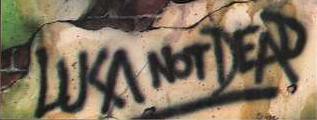From Wikipedia:
The Argentine rock movement was truly one of the first non-English forms of rock to be commercially successful outside its own nation.
Argentine rock, which was the first kind of rock in Spanish ever to emerge in either Spain or Latin America, has a “founding trilogy” in 1967 with three mythical bands:
- Los Gatos (“The Cats”), similar to the Beatles, they disbanded in the 60’s;
- Manal, more of a blues / hard rock thing, first aligned with the Stones and later aligned with the heavy metal movement until the 80’s;
- Almendra (“Almond”) which was the real start of argentine progressive rock, also disappeared in the 60’s.
The founder of Almendra is the ENORMOUS, GIANT, KING OF PROGRESSIVE, Luis Alberto Spinetta, one of the best musicians of the 20th century, without any doubt, with over 45 years of a non-stop career. He’s still playing occassionally, and in 1973 he recorded with a later band (“Pescado Rabioso”, “Rabid Fish” in Spanish) the album “Artaud” which is regarded as one of the highest moments of argentine progressive rock, and one of the best albums of its time.
![]()
Above: Luis Alberto Spinetta (left) and Charly García in the ’80s
Listen to track #7 “Bajan” (“They are going down”) and #9 “Las Habladurias del Mundo” (“The Gossip of the World”). Those two tracks are the best IMHO, but in the good progressive fashion, the album is a highly conceptual one with a central story centered around Antonin Artaud’s poems, that can be listened from start to end like a an opera.
Spinetta played not long ago in the Colón Theatre, one of the most important and biggest opera houses of the world, which is said to have “one of the five best acoustics in the world”…! I’ve been there twice. It’s unbelievably beautiful.
Sumo: this band was formed in 1981 by Luca Prodan, an Italian/English guy who went to Argentina to escape his heroin addiction, but died of cyrrhosis and cocaine in 1988, after having changed the argie music forever. He was the only one who dared sing in English in Argentine radios during the Falkland’s war.
His death was so terrible to argentines that graffittis saying “Luca Not Dead” still appear (written in English) in Buenos Aires. His influence is absolute. All the bands now say they were influenced by Sumo. I still remember the newspapers announcing his death. I was in secondary school at the time. All the kids were sad, even crying.
I recommend their album Divididos por la Felicidad (“Divided by Happiness”). Start with the all-time-classic #1, “La Rubia Tarada” (“The Dumb Blonde”), a rant against the trendy first class of Buenos Aires in the 80’s, and then move to #7, “Mejor no Hablar de Ciertas Cosas” (“Better not to talk about some things”). These two songs are simply, classics.
After Prodan died, Sumo split into two bands: Divididos (“Divided”) and Las Pelotas (“The Balls”). The first is more commercial and high profile, the second more progressive and underground. Divididos is called the “La Aplanadora del Rock” (“The Leveller of Rock”) given that they offer mega-concerts (at 100'000 people piece) lasting over 4 hours of pure rock.
Divididos’ album Narigón del Siglo (“Big-nosed-guy of the Century”) was recorded at Abbey Road studios, and is particularly representative of Divididos. This is really, really a rock band, in the purest sense of the term. My preferred tracks are #6 “Elefantes en Europa” (“Elephants in Europe”), which will explain you the “The Leveller of Rock” nickname…! And #11 “Pasiones Zurdas Derechas” (“Right-wing Lefty Passions”). Amazing rock. Really puts you in good mood.
From Las Pelotas’, I recommend Mascaras de Sal (“Masks of Salt”). Much more studied, thoughtful, very interesting and progressive. I love it. I recommend “Senderos” (“Paths”), track #1. But the whole album is simple IN-CRE-DI-BLE.
Soda Stereo: (“Stereo Sparkling Water”) is one the best selling argentine acts of the last 30 years. They are the incarnation of argentine pop, simple, and pure. They started in 1981 and finished in 1997 with a mega concert of 3 days in the largest football stadium in Buenos Aires. Listen to their 20 Greatest Hits album, for your listening pleasure: they are REALLY good, timeless kind of good. Start with tracks #3 “Nada Personal” (“Nothing Personal”) which is really representative of their 80’s, and then go to tracks #15 “Lo Que Sangra - La Cúpula” (“What Bleeds - The Cupola”) and #14 “Un Millón de Años Luz” (“One Million Light-Years”), the latest a much more mature and elaborated song, considered the most beautiful track of the band. Really my all time favorites.
Finally, Bersuit Vergarabat (or simply Bersuit, a name that doesn’t mean anything, really :) simply put, the most important band of the past 20 years. And still alive and kicking. They are very good. Capables of everything and anything: ska, rock, tango, pop, samba, murga, etc. Bersuit is one of those bands that 40 years from now will have streets named after them. They are really the biggest milestone in Argentine music since Sumo.
Their most interesting studio album is Hijos del Culo (“Sons of the A**” :) Listen to #12 “Negra Murguera” (“Black Woman from the Murga”) and #2 “La del Toro” (“The Song of the Bull”). The whole album goes from one style to the other, their lyrics are hilarious and at the same time terrible, they really sing the Argentine of today.
To close the loop, here’s the main singer of Soda Stereo (Gustavo Cerati, on the left) with Spinetta himself (at the right) singing “Bajan” from Pescado Rabioso (which I mentioned above) live:
And the argentine rock fan watches in awe, reverence, wonderment, admiration, as two epochs meet, greet and sing.
This video is a cornerstone moment in the history of argentine rock. I’m almost in tears.
